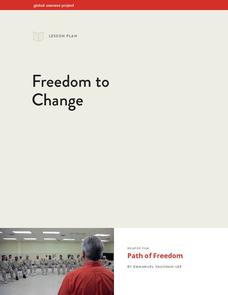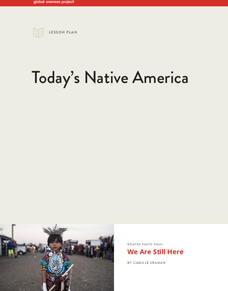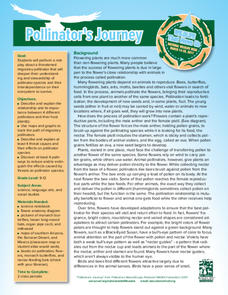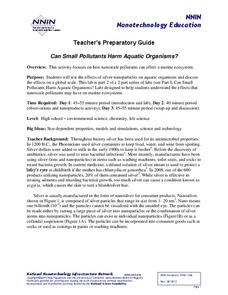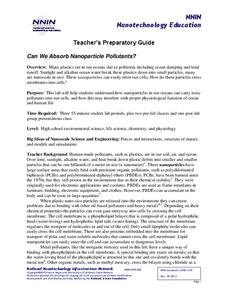Rice University
Biology for AP® Courses
An eight-unit electronic textbook provides a guide to AP® Biology. Each of the 28 chapters include an introduction, multiple lessons, a summary, review questions, and test prep questions. Teachers see how each lesson connects to a big...
Howard Hughes Medical Institute
Gorongosa: Making Observations Activity
Do you have young scientists wanting to make new discoveries rather than just completing the same experiments? Young scientists use their observational skills to identify animals and patterns in animal behavior. Through tracking...
University of Minnesota
Mirroring Emotions
Do you ever give your class the "teacher look"? Without saying a word, they become silent and engaged (hopefully). How do they know what you're thinking? Explore the concept of nonverbal communication and how it relates to our mirror...
Global Oneness Project
Freedom to Change
Here's something unusual and thoughtful: have your scholars do some pensive reflection themselves before tackling how such meditative techniques are used in prison rehabilitation programs. They watch the "Path of Freedom" video found...
Global Oneness Project
Learning with Nature
Think outside the box - and think about education beyond the classroom walls - with a resource that has your critical thinkers watching a video about a nursery in Scotland that lets youngsters roam wild in a forest. Viewers reflect on...
Global Oneness Project
Citizen Photojournalism
Matt Black's photo essay, "The Geography of Poverty" provides a shocking reminder of the poverty that exists in the United States. The resource not only focuses attention on poverty but also conditions that have given rise to situation...
National Park Service
Fire Ecology on the Rim
An engaging unit on wildfires includes three sections, including a background section with eight lessons and five activities, a field experience section with 13 lessons and five activities, and a conclusion section featuring an analysis...
Omaha Zoo
Monitoring Amphibians
What sort of shoes do frogs wear? Open toad sandals. If your scholars want experience collecting field samples, this is the lesson for you. After learning the proper way to collect field samples, pupils catch amphibians to test for...
Consortium for Ocean Science Exploration and Engagement (COSEE)
Plankton to Penguins: Antarctic Food Web
A well-written lesson plan, second in a series of four, gets high schoolers exploring how the Antarctic food web is impacted by climate change and the associated melting of polar ice sheets. It begins with a PowerPoint presentation about...
Global Oneness Project
Today’s Native America
The 2016-2017 protests over the Dakota Access Pipeline (DAPL) motivated Camille Seaman to create "We Are Still Here," a photo essay featuring portraits of contemporary Native Americans who protested the pipeline. This eight-page packet,...
Global Oneness Project
Cultural Heritage: Recording a Native Language Dictionary
How do you rebuild a language that has been banned for years? A short video introduces high schoolers to Marie Wilcox, A Wukchumni Native American from Central California who, for over 20 years, worked on comprising a dictionary of the...
Children’s Hospital of Philadelphia
Discovery and Development of Vaccines
Stop the spread. Pupils work through two activities to gain an understanding of vaccines and immunity. Learners research different types of vaccines and how they are made and explore the advantages and disadvantages of them. Using a...
National Wildlife Federation
Planning Your Research
Make it a great proposal! Class members play the role of marine scientists and choose from a variety of whales considered endangered they would like to study. Scholars then create applications for permits to conduct research of the...
National Wildlife Federation
Pollinator's Journey: Grades 9-12
Gain a deeper understanding of migratory pollinators. After studying about pollinators and their effects on flowering plants, learners hear a story about the migration of Monarch butterflies and bats in the Sonoma Desert. Small groups...
National Wildlife Federation
Fish and Ladders: Grades 9-12
Swim with the big fish. Using a similar simulation as Fish and Ladders: Grade 5-8, pupils model the migration of Chinook salmon. A large group of the learners play the role of fish, while others are fishers, predators, and hazards....
Howard Hughes Medical Institute
West Nile Virus: Vectors and Hosts Game
The spread of an infectious disease can be a complicated process. Using a game approach, learners reenact the spread of the West Nile virus. They learn the need for the vector in transmitting the disease and how different organisms react...
Howard Hughes Medical Institute
The Mosquito Life Cycle Activity
Understanding the life cycle of a mosquito helps us understand how to prevent the spread of diseases they carry. A lab investigation provides learners with the opportunity to track the two-week life cycle of the mosquito. Scholars make...
Howard Hughes Medical Institute
Battling Vector-Borne Diseases: Factors That Affect the Mosquito Life Cycle
Slow the spread of disease by slowing disease carriers in their tracks. Learners explore just how they might accomplish this as they experiment with the life cycle of a mosquito under different conditions. Scholars design and conduct...
National Nanotechnology Infrastructure Network
Can Small Pollutants Harm Aquatic Organisms?
Nanoparticles have toxic effects on plant and animal life—even though you can't see them. The second instructional activity of a two-part series has young scientists conduct an experiment that exposes plant and animals to nanoparticle...
National Nanotechnology Infrastructure Network
How Can Nanoparticles Move from Land to Ocean?
Investigate the migration of the nanoparticle from land to water! A lab investigation asks budding scientists to simulate runoff. Testing water samples before and after the simulation leads individuals to make conclusions about pollution...
National Nanotechnology Infrastructure Network
Can We Absorb Nanoparticle Pollutants?
Just because we can't see it doesn't mean it isn't there! A growing concern for environmental scientists is toxic nanoparticles in our air and water. Young scholars conduct an experiment to demonstrate how these particles can cross our...
National Nanotechnology Infrastructure Network
Creating and Testing Silver-Nanoparticle Socks
Antibacterial socks are a product of nanotechnology. An inquiry-based instructional activity asks collaborative groups to create their own antibacterial socks and then test them against other products on the market. The sock with the...
Howard Hughes Medical Institute
How Animals Use Sound to Communicate
Communication involves the visual, auditory, olfactory, and tactile senses. Scholars observe groups of animals communicating through multiple senses. They note and learn why different species use different senses depending on their...
Howard Hughes Medical Institute
Gorongosa: Scientific Inquiry and Data Analysis
How does the scientific process begin? Introduce ecology scholars to scientific inquiry through an insightful, data-driven lesson. Partners examine data from an ongoing research study to determine the questions it answers. The resource...





